Recent News
- SRM University-AP develops sustainable transparent “biofilm” to replace plastic cuvettes September 21, 2021
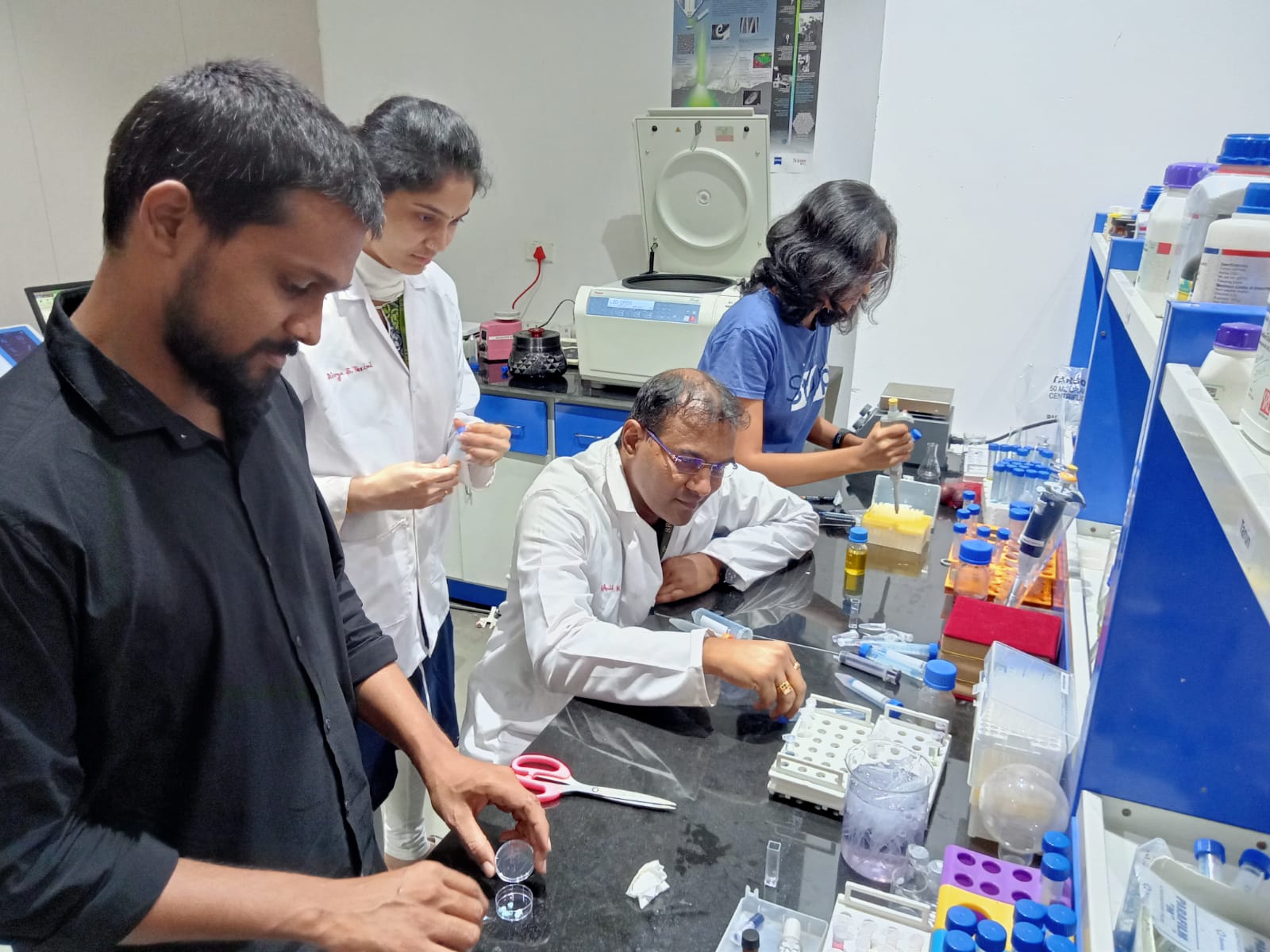 Dr Anil K Suresh, Associate Professor, Department of Biological Sciences, and his team from SRM University-AP recently developed a see-through transparent (with 85% above transmittance) biotemplate which they derived from the fish scale wastes to substitute the extensive usage of eco-unfriendly disposal plastic cuvettes for UV-Visible Spectroscopy measurements in the spectrum of 350-900 nm. UV-Vis spectroscopy is a versatile analytical tool used to examine the nature of various synthetic, biological and clinical molecules for pharmaceutical and environmental applications. The team members demonstrated the practical on-biotemplate analysis of diverse analytes such as DNA, proteins, nanoparticles, organic dyes, bacteria, BSA assay and dye-degradations.
Dr Anil K Suresh, Associate Professor, Department of Biological Sciences, and his team from SRM University-AP recently developed a see-through transparent (with 85% above transmittance) biotemplate which they derived from the fish scale wastes to substitute the extensive usage of eco-unfriendly disposal plastic cuvettes for UV-Visible Spectroscopy measurements in the spectrum of 350-900 nm. UV-Vis spectroscopy is a versatile analytical tool used to examine the nature of various synthetic, biological and clinical molecules for pharmaceutical and environmental applications. The team members demonstrated the practical on-biotemplate analysis of diverse analytes such as DNA, proteins, nanoparticles, organic dyes, bacteria, BSA assay and dye-degradations.Dr Anil claims that the large-scale development of the biotemplate can resolve several issues in performing sustainable research; for instance, generates huge demand for fish scales as a resource stratagem otherwise causative of foul smell and disease propagation when discarded. Second, the use of non-biodegradable plastic cuvettes can be minimized for routine analytics and third, unlike plastic cuvettes that demand 500-fold analyte our biotemplate allows the analysis at a very low 10 microlitre volumes, making it feasible to analyse expensive, rare, and high-risk analytes. Dr Anil K Suresh owns the copyrights for this pathbreaking invention by being granted an Indian patent. This work is accepted for publication in the prestigious Journal of “Green Chemistry” by the Royal Society of Chemistry. Read the full paper here.
Adding to the mechanistic, Dr Anil said, “naturally acquired droplet retaining ability for over 30 minutes against gravity while vertically positioning the biotemplate supported such ultra-low volume measurements and monitoring of chemical reactions in-situ”. Interestingly, the same ability allows the retrieval of the analytes after completion of the analysis, crucial for precious analytes. Dr Anil says the best part is that the transparent biotemplate can be discarded back into the environment post-usage without any hesitation as the biotemplate is completely biodegradable.
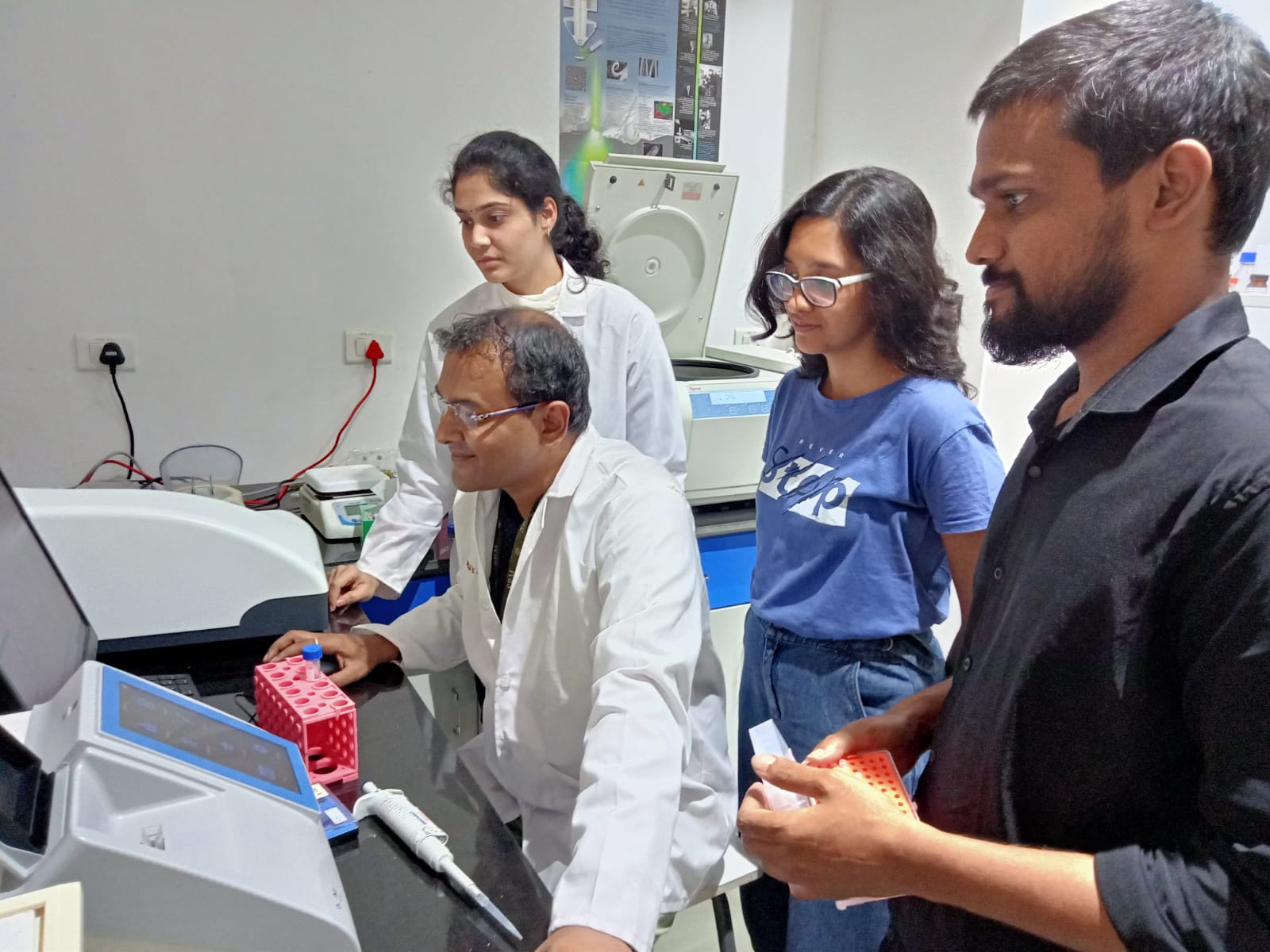
Further, the research group demonstrated ease in large-scale production by generating ~3000 bio templates at an affordable price. Dr Anil emphasised that this low-cost, plastic-free, use-and-throw biodegradable transparent biotemplate stemmed from food waste as a bioresource stratagem has huge potential in routine scientific and pharma UV-Vis analytics and he will very soon bring this product to the scientific community as a sustainable science solution.
Dr Anil Suresh concluded that this breakthrough conception would not have been possible without the rigorous efforts of his team and the continuous support from the university management, who are also encouraging and willing to support Dr Anil to establish his own start-up within the University. Dr Anil Suresh thanked his group members Ms Divya Parimi, Mr Chandra Bhatt, Mr Tharun Bollu and Ms Madhura, his collaborators Dr Malli and Mr Jacob. Dr Anil’s team especially thanked the management of SRM University-AP; the President Dr P. Sathyanarayanan for his generous support, Prof D Narayana Rao, Pro-Vice-Chancellor for his constant untiring encouragement, motivation and support in all his scientific endeavours, and the Vice-Chancellor Prof V S Rao for his kind support.
Continue reading → - Research scholar gets prestigious scholarship from IRRI September 16, 2021
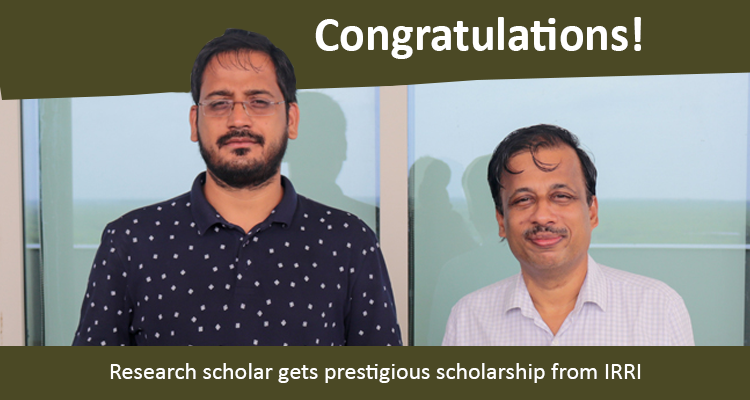 A Doctor of Philosophy (PhD) student of the Department of Biological Sciences at SRM University-AP, Andhra Pradesh, Faraz Azeem, has been awarded a prestigious scholarship by the International Rice Research Institute (IRRI), Manila, Philippines. The scholarship will enable Faraz to carry out a part of his PhD research under the supervision of Dr Jauhar Ali, Senior Scientist-II, Head – Hybrid Rice Development Consortium (HRDC), Leader – Hybrid Rice Breeding Cluster, Rice Breeding Platform, International Rice Research Institute, Los Banos, Philippines, for a period of one year and four months.
A Doctor of Philosophy (PhD) student of the Department of Biological Sciences at SRM University-AP, Andhra Pradesh, Faraz Azeem, has been awarded a prestigious scholarship by the International Rice Research Institute (IRRI), Manila, Philippines. The scholarship will enable Faraz to carry out a part of his PhD research under the supervision of Dr Jauhar Ali, Senior Scientist-II, Head – Hybrid Rice Development Consortium (HRDC), Leader – Hybrid Rice Breeding Cluster, Rice Breeding Platform, International Rice Research Institute, Los Banos, Philippines, for a period of one year and four months.Faraz joined SRM University-AP, Andhra Pradesh, in January 2021 and is working on “Understanding the genetics and molecular biology of nitrogen-use efficiency in rice” under the guidance of Prof Jayaseelan Murugaiyan, HoD, Department of Biological Sciences, SRM University-AP. Dr P Sathyanarayanan, President; Prof V S Rao, Vice-Chancellor; Prof D Narayana Rao, Pro-Vice-Chancellor of SRM University-AP congratulated Faraz for this accomplishment.
The International Rice Research Institute (IRRI) is a global agricultural research and training organisation with offices in seventeen countries and headquarters in Los Banos, Laguna, Philippines. IRRI is well-known for its role in producing rice varieties that contributed to the 1960s Green Revolution, which helped Asia avoid famine. The CGIAR Consortium of International Agricultural Research Centres, a global alliance of institutions involved in food security research, includes 15 agricultural research centres worldwide. The International Rice Research Institute (IRRI) is one of the Asia’s largest non-profit agricultural research facility.
SRM University-AP provides a wide array of opportunities and benefits along with its PhD Programmes. The nascent university has more than 150 PhD students to date in various departments of Engineering, Science, Liberal Arts, Business Administration and Social Sciences. SRM University-AP university has a vibrant research environment with state-of-the-art facilities along with attractive fellowship and complimentary food and accommodation at the university campus. The faculty advisers have paramount knowledge and experience in research along with international exposure. The university also provides support for journal publications, patent filing, and attending national and international conferences.
SRM University-AP further has MoUs with reputed universities abroad for Student Exchange Programme. In addition, the university is conducting research projects funded by prominent organisations, industries and the Government of India. Research projects sponsored by DST, DST-NSM, DBT, DBT-Wellcome Trust, UGC-DAE, ARBL, Titan industries etc are a few of the current ongoing projects.
Continue reading → - Microalgal biomass heralds sustainable biofuel production June 14, 2021
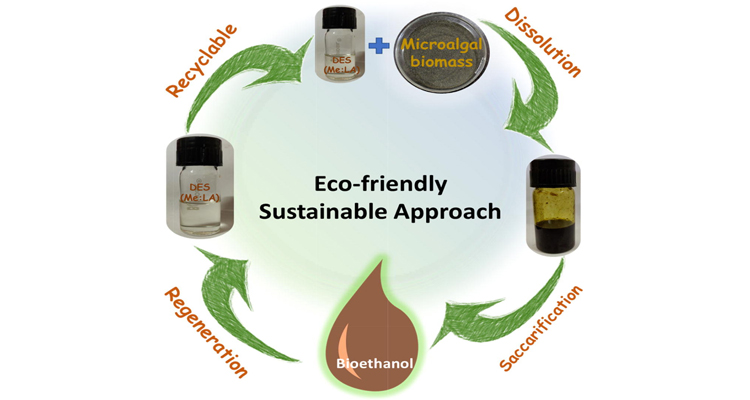 Dr Imran Pancha, Assistant Professor in the Department of Biological Sciences, has recently published a paper titled “Deep eutectic solvents and Ionic liquid assisted hydrolysis of microalgal biomass: A promising approach towards sustainable biofuel production” in the celebrated Journal of Molecular Liquids (2021): 116264 (Impact Factor-5.065). The study was conducted in association with Akshay Kulshrestha, Sandhya Mishra, and Arvind Kumar from CSIR-CSMCRI
Dr Imran Pancha, Assistant Professor in the Department of Biological Sciences, has recently published a paper titled “Deep eutectic solvents and Ionic liquid assisted hydrolysis of microalgal biomass: A promising approach towards sustainable biofuel production” in the celebrated Journal of Molecular Liquids (2021): 116264 (Impact Factor-5.065). The study was conducted in association with Akshay Kulshrestha, Sandhya Mishra, and Arvind Kumar from CSIR-CSMCRIMicroalgae is recently considered one of the promising biomasses for the production of renewable energy such as biodiesel and bioethanol. Microalgae are tiny photosynthetic organisms that utilise atmospheric CO2, water and sunlight to produce carbohydrates and lipids, which can be converted into renewable fuels. Compared to higher plants, microalgae is a good platform for bioethanol production as they do not contain any lignin in their cell composition, which makes pre-treatment for biomass hydrolysis easy. In the present study, Dr Pancha and his team explored the use of green solvents ionic liquids (ILs) and deep eutectic solvents (DESs) for microalgal hydrolysis. They observed that among the eight tested ionic liquids, ethyl ammonium nitrate (EAN) resulted in the highest saccharification yield of 95.5%. Whereas, among hydrophobic deep eutectic solvents, menthol: lactic acid (Me: LA) exhibited the highest saccharification yield of 85.7% and also did not require any additional high temperature or other pre-treatments for biomass hydrolysis, indicating as the potential solvent system for microalgal biomass hydrolysis. Overall, the present study results indicated that the identified IL and DES could be used as a green and sustainable alternative for the pre-treatment of microalgal biomass for bioethanol production.
Due to limited fossil fuel reserve as well as environmental issues like high greenhouse gas emission and other environmental problems, finding green and sustainable energy resource is of prime importance for today’s world. To solve this problem, microalgae are among the best resources for producing renewable resources due to it’s high growth rate and photosynthetic ability. Microalgae also have the ability to obtain nutrients from various wastewater, so they also do not require fresh water for cultivation. However, commercial-scale production of microalgae-based biofuels faces various problems such as cultivation cost, downstream processing for biofuel production etc. In this regard, in the present work, Dr Pancha demonstrated the use of ILs and DESs for pre-treatment of microalgal biomass for reducing sugar production, which can be further utilised to produce bioethanol.
Dr Pancha and his research group are further devoted to understanding the molecular mechanism behind the accumulation of energy reserved compounds in the microalgae and developing a sustainable biorefinery process to extract biofuels and other industrially relevant compounds from single microalgal biomass.
Read the full paper: https://doi.org/10.1016/j.molliq.2021.116264
Continue reading → - Student interview: On getting admissions in foreign universities June 10, 2021
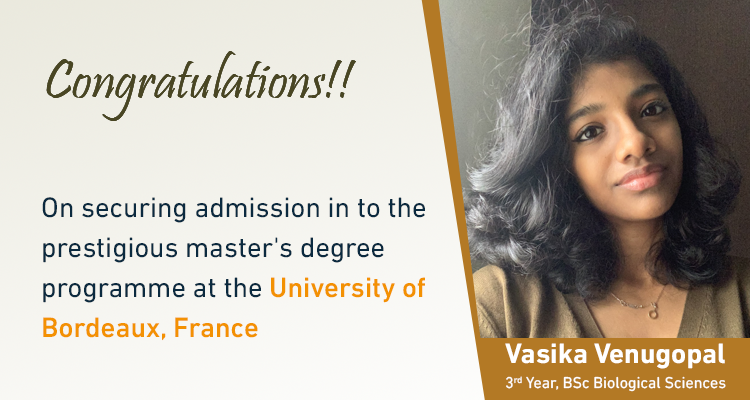 Ms Vasika Venugopal, a final year BSc Biology student at SRM University-AP has secured awe-inspiring admissions in a number of eminent higher education institutions inside and outside India. She is selected for the Master’s programme at the University of Tübingen, Germany; Charité -Universitätmedizin Berlin, Germany; University of Wuerzburg, Germany; Goethe-University, Frankfurt, Germany; University of Paris-Saclay, Paris, France; University of Bordeaux, Talance, France; Université de Paris, Paris, France; and for an Integrated PhD degree at National Centre for Biological Sciences (NCBS), Bangalore. She was also shortlisted in the following Universities viz Ludwig Maximilians Universität München, Germany (MSc Molecular and Cellular Biology); Ulsan National Institute of Science and Technology, South Korea; University of Bonn, Germany (MSc Neuroscience); JNCASR, Bengaluru (Integrated PhD Biological Sciences); and IISER, Pune (Integrated PhD Biological Sciences).
Ms Vasika Venugopal, a final year BSc Biology student at SRM University-AP has secured awe-inspiring admissions in a number of eminent higher education institutions inside and outside India. She is selected for the Master’s programme at the University of Tübingen, Germany; Charité -Universitätmedizin Berlin, Germany; University of Wuerzburg, Germany; Goethe-University, Frankfurt, Germany; University of Paris-Saclay, Paris, France; University of Bordeaux, Talance, France; Université de Paris, Paris, France; and for an Integrated PhD degree at National Centre for Biological Sciences (NCBS), Bangalore. She was also shortlisted in the following Universities viz Ludwig Maximilians Universität München, Germany (MSc Molecular and Cellular Biology); Ulsan National Institute of Science and Technology, South Korea; University of Bonn, Germany (MSc Neuroscience); JNCASR, Bengaluru (Integrated PhD Biological Sciences); and IISER, Pune (Integrated PhD Biological Sciences).Here’s an exclusive interview with Ms Vasika Venugopal:
Hi Vasika, can you tell us how you developed your interest in neuroscience?
For as long as I could remember, I have held a deep-rooted interest in neuroscience. The brain is one of the finest examples of synergy. It has always baffled me that the stream of thoughts that we call consciousness could arise from a series of neurons firing action potentials from one point to another. The entire world around us is reconstructed only using receptors on neural tissue and neurotransmitters. In our head, we house a mere handful of a mass of cells, but “it can contemplate the meaning of infinity, and it can contemplate itself, contemplating the meaning of infinity.” I find that quite ironic and miraculous at the same time. When we look at the parts of the brain, we expect nothing magnificent to arise from it, but the magnitude of emotions we feel, thoughts that we manifest, and memories that we recall are all testament to something more. This is why I have chosen to pursue Neuroscience.What is your motivation for choosing the University of Bordeaux, France among all other Universities?
After a period of deliberation, I have finally decided to accept the admission offer into the Bordeaux International Masters in Neuroscience Program at the University of Bordeaux, France. This international Master’s program provides a unique interdisciplinary and integrated training approach that covers all major topics of brain research, from normal brain functions to brain disorders. Neuroscience in Bordeaux has grown over the last 15 years to become one of the largest Neuroscience scientific communities in France and in Europe, with over 600 people working in the various Neuroscience laboratories of the University of Bordeaux. In order to meet the most important challenges facing Neuroscience research, all these laboratories are grouped within a virtual institute, called the Bordeaux Neurocampus, a multidisciplinary consortium of world-renowned scientists. Bordeaux Neurocampus offers, together with our international academic partners, excellent opportunities for traineeships.Is there any scholarship offered in the University where you are enrolling into?
One of the key points of the program is that students are offered scholarships based on their performance. As for my admission, I am eligible for a partial tuition fee waiver. Students completing their traineeship in a laboratory of the University of Bordeaux receive a monthly stipend during the traineeship as well.Can you brief the application process for those students who dream to study abroad?
In general, for applications to universities in France, you would have to apply through the Campus France website. However, for the universities that I had applied to, such as the University of Paris, the University of Bordeaux, and the University of Paris-Saclay, one could directly apply to the program itself. The application process is pretty simple, and you would require only basic documents such as an ID, academic transcripts, a bonafide certificate issued from the university, a proof of English proficiency, a letter of motivation, reference letters, your curriculum vitae, etc. I have written the DELF examination for French, and possess certifications from Alliance Francais. I believe this would also be helpful for other students as well. The search for programs in English might be exhaustive, and one might have to go through a university’s website before applying as some of the modules might be in French. Following applications, one would have to undergo interviews with the admission board, which is honestly the scariest part, and depending on your performance and application, your admission is decided. In the case of most German universities that I had applied to, I had to submit my application with the basic documents through the university website and was called for an entrance exam if my application was shortlisted. If my performance in the entrance exam was satisfactory, I would then be called for a minimum of one interview, and a maximum of two. In some cases, like the University of Wurzburg, you would also have to present your research work in a 10-minute presentation and defend your hypothesis through the questioning round that follows. Honestly, this part is very exciting! As a whole, the application process is intensive, but it is an opportunity for you to grow your network and learn to think in ways you haven’t before. I am still in contact with most of the professors that had interviewed me, and talking to different people has honestly helped grow my sphere, which has been hard due to the pandemic.Amazing! Can you talk about the support that you have received from your department at SRM-AP during these application processes?
Continue reading →
Throughout the rigorous processes of applications, professors from the Department of Biological Sciences were extremely helpful. Dr Manjunatha Thondamal’s knowledge of the French education system and his relentless aid in modifying my letter of motivation were extremely helpful. Prof Jayaseelan Murugaiyan and Dr Imran Pancha were incredibly patient with the number of recommendation letters they had to write for my applications. Each of them took their own time to help me pick universities and courses, discussing their pros and cons along the way. I have received a lot of support and advice from my department throughout my time at SRM for my education, internships, projects, and Master’s application, and I’ll always be grateful for that. - Final year B.Sc. Biology student secures admission in University of Paris-Saclay, France June 10, 2021
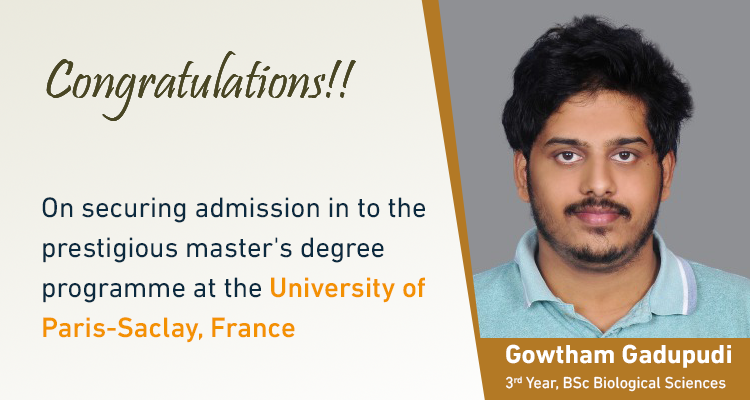 Student Interview: Gadupudi Gowtham
Student Interview: Gadupudi Gowtham
Q: Hi Gowtham, could you elaborate on the master’s program that you are being enrolled in?
A: Sure. M1 Life Sciences and Health – International Track – France, is a Master’s Program in the University of Paris-Saclay, France. I am enrolled in this research-driven multidisciplinary Master’s Program of two semesters that will nurture my research interests and can help me develop individual research trajectories.Q: Please explain how this course is multidisciplinary.
A: This Master’s program is divided into three parts. During the first part of the program, all students are required to study Core Courses that address key concepts and challenges in the following basic fields of Life Sciences and Health. In the second part of the program, students can choose among a wide range of Elective Courses according their academic and career development goals. The third part is Research training which includes 4-week laboratory rotation period + 8-week internship.Q: Had you applied to any other University?
A: Along with this university, I have also applied for Master of Science, Molecular Biology and Evolution (MAMBE) at the Christian – Albrecht University of Kiel, Kiel, Germany, and some other universities. MAMBE is an international program, taught entirely in English, and it is based on the fruitful collaboration with the Max-Planck Institute for Evolutionary Biology in Plön. Together with further collaborations (with the Leibniz Science Campus EvoLUNG (Evolutionary Medicine of the Lung), and also the Collaborative Research Centre 1182, Origin and Function of Metaorganisms), it specifically combines the areas of evolution and molecular biology – a combination which has emerged as an extremely successful interdisciplinary research field in recent years but has not yet been available in academic education.Q: Can you talk about the Universities where you have applied in some detail?
A: In France, the University of Paris Saclay is a collaboration from all the respected universities with more than 300 laboratories with funding from the French government. And Kiel has emerged as a hotspot for Evolutionary Research in Germany. This includes several research groups with a focus on evolutionary topics at Kiel University (CAU).Q: What are the scholarships that you have applied for?
A: Currently, at Paris- Saclay I haven’t applied for any scholarship yet but it has an Idex Scholarship for those who enroll in the Master’s Program.
In the MAMBE program, I have applied for the DAAD short-term scholarships and Promo’s scholarship for doing my Master’s thesis. Also, MAMBE has HiWi jobs as a research assistant at the desired lab. As a student affiliated to the Royal Society of Biology, I can also utilize the grants for my travel and Research Projects every year.Q: How was your preparation for applications?
A: When I applied to the University of Paris Saclay, I applied through their University Portal. After verifications, I received an invitation for the Interview. On the day of the interview, I was asked about my current research project at SRM-AP, my motivation to study, and my future research goals and after 5 days I received an email stating that I was accepted.
I searched about German Universities through DAAD which is a database for education in Germany. After selecting the university, I had applied both online and through the post. Currently, it is being processed by the Uni- Assist where after meeting the requirements my application will be forwarded to the MAMBE admission team.Q: Did you receive any support from SRM-AP and your department?
Continue reading →
A: I can’t forget the support that I have received from SRM-AP University in providing me with the required attested documents and also giving necessary permissions during the pandemic. From the Department of Biological Sciences, the recommendation letters from Dr Jayaseelan Murugaiyan and Dr Manjunatha Thondamal supported my application to the universities that I have applied. The support and appreciation from everyone in the Biological Sciences Department has played an essential role in securing this admission. - Prof C Durga Rao answers concerns regarding coronavirus third wave June 8, 2021
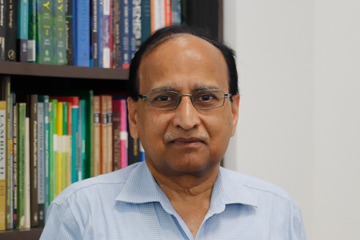 Eenadu newspaper has published an informative interview with Prof C Durga Rao, Professor of Biological Sciences & Associate Dean, School of Engineering and Sciences, and School of Liberal Arts and Social Science (SLASS), in their front page on the most relevant topic of our times, ‘Corona Virus and its Mutations’. As the world stays petrified awaiting further mutations of Covid-19 virus, Dr Rao clearly answered the pertinent questions regarding the waves of pandemic in this exclusive interview.
Eenadu newspaper has published an informative interview with Prof C Durga Rao, Professor of Biological Sciences & Associate Dean, School of Engineering and Sciences, and School of Liberal Arts and Social Science (SLASS), in their front page on the most relevant topic of our times, ‘Corona Virus and its Mutations’. As the world stays petrified awaiting further mutations of Covid-19 virus, Dr Rao clearly answered the pertinent questions regarding the waves of pandemic in this exclusive interview. Detailing from the process of cell division to the natural process of origin of mutations, he talked about the harmless viruses and the pathogenic viruses that influence the immune system of the human body. Moving on to the antiviral medication, he cautioned against Remdesivir, a drug widely used for Covid-19 treatment. Majority of antiviral drugs are similar to the nucleotides in viral RNA, and are called analogues. As the virus keeps an mutating naturally because of the error-prone viral RNA polymerase that synthesizes progeny viral RNA copies, when a drug is frequently given to a patient, mutants that are resistant to the drug will be selected to replicate in the presence of the drug. Thus, when the same drug is given to treat the new mutant that escapes, the drug will not work against the new variants.
The single mutations L452R and E484Q, first detected in variants in the US and South Africa, respectively, occurred simultaneously in the double mutant, first detected in India. There is nothing surprising in finding double mutants as a variety of mutants are produced in a single patient, but only a few, which are capable of faster replication and spread will be able to survive in the population. As we have a large population density, the double mutant, which binds to the ACE2 receptor on the cell surface and enters into the cell more efficiently, spread like wildfire from December last year to March this year. To face the potential threat of the third wave of Covid-19 virus that is looming around us, the people have to take necessary precautions and comply with the lockdowns and restrictions. Though a third wave is inevitable, it is possible for India to avoid the severe impact of the third wave through wearing a mask, and immunization, he said. Approval of more vaccines and enhancing the delivery of vaccines across the country can shield the population from severe coronavirus disease and death.
Dr Rao, whose major research areas include Molecular Virology, Recombinant DNA technology, Vaccines and Diagnostics had been a professor and INSA Senior Scientist at Indian Institute of Science (IISc). He is currently working on a project worth 1.10 crore.
Continue reading → - ICMR-NIN Scientist on the Dietary Risk Factors for NCDs June 4, 2021
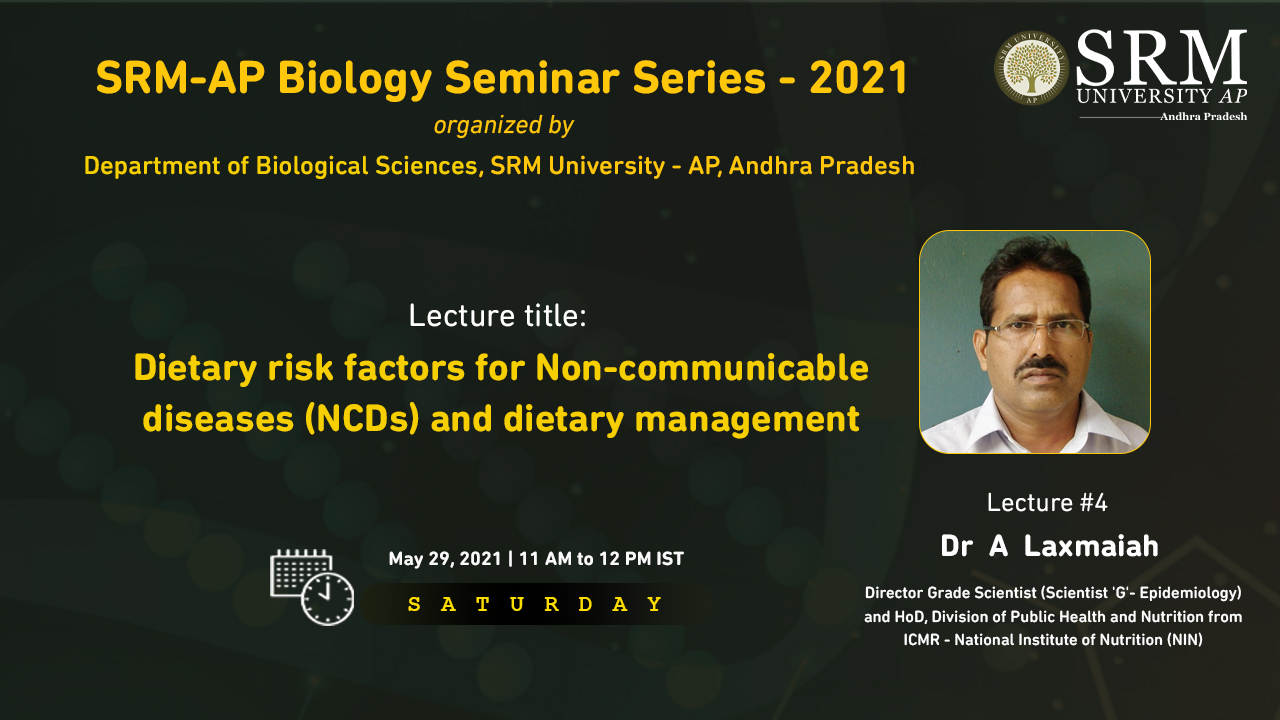 A profound and astute fourth edition of the Biology Seminar Series on the theme “Dietary Risk Factors for Non-communicable Diseases (NCDs) and Dietary Management”, which was held on May 29, 2021, addressed the vital questions on factors contributing to the rise in non-communicable diseases. Dr A Laxmaiah, Director Grade Scientist (Scientist ‘G’- Epidemiology) and HoD, Division of Public Health and Nutrition from ICMR – National Institute of Nutrition (NIN), elucidated on the topic and discussed the role of nutrition in alleviating such risks.
A profound and astute fourth edition of the Biology Seminar Series on the theme “Dietary Risk Factors for Non-communicable Diseases (NCDs) and Dietary Management”, which was held on May 29, 2021, addressed the vital questions on factors contributing to the rise in non-communicable diseases. Dr A Laxmaiah, Director Grade Scientist (Scientist ‘G’- Epidemiology) and HoD, Division of Public Health and Nutrition from ICMR – National Institute of Nutrition (NIN), elucidated on the topic and discussed the role of nutrition in alleviating such risks.Dr Laxmaiah stated that almost 38% of children in India are stunted and over 21% are wasted, which is a very alarming statistic. He also noted that, according to reports, more than 60% of the country’s population suffers from iron deficiency, as well as other serious vitamin deficiencies. According to him, a 2016 study discovered that almost 5.8 million people die in India each year because of non-communicable ailments. Dr Laxmaiah stated that the rise in NCDs is primarily due to smoking, physical inactivity, harmful alcohol consumption, and unhealthy diet. The poor dietary intake among Indians was identified as an alarming issue and he further highlighted the need for individuals to adhere to a traditional diet rich in vitamins and minerals. The session was aimed to raise community awareness on the risk factors for non-communicable disease and the urgency of taking action to address the growing concern of NCDs.
Upon the completion of the lecture, an interactive discussion session followed with the topic overview, providing participants with an opportunity to ask in-depth questions.
Pre-Event Release: https://srmap.edu.in/events/biology-seminar-series-04/
Continue reading →

